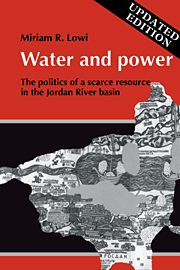Book contents
- Frontmatter
- Contents
- List of illustrations
- List of tables
- Preface
- Preface to the paperback edition
- List of abbreviations
- 1 Introduction: conflict and cooperation in international river basins
- Part I Riparian dilemmas
- Part II The Jordan waters conflict
- Part III The Jordan basin since 1967
- 6 Water and development in Israel and Jordan
- 7 Riparian relations and the perception of conflict
- 8 Riparian disputes since 1967
- 9 Conclusion: The conduct of riparian dispute and the potential for cooperation in international river basins
- Appendix 1 US involvement in water development in the Jordan basin
- Appendix 2 The unified development of the water resources of the Jordan Valley region
- Appendix 3 The Arabs' plan for development of water resources in the Jordan Valley
- Appendix 4 The Cotton plan for the development and utilization of the water resources of the Jordan and Litani River basins
- Appendix 5 Annex II: from, Treaty of Peace Between the State of Israel and the Hashemite Kingdom of Jordan
- Notes
- Select bibliography
- Index
- Cambridge Middle East Library
7 - Riparian relations and the perception of conflict
Published online by Cambridge University Press: 08 December 2009
- Frontmatter
- Contents
- List of illustrations
- List of tables
- Preface
- Preface to the paperback edition
- List of abbreviations
- 1 Introduction: conflict and cooperation in international river basins
- Part I Riparian dilemmas
- Part II The Jordan waters conflict
- Part III The Jordan basin since 1967
- 6 Water and development in Israel and Jordan
- 7 Riparian relations and the perception of conflict
- 8 Riparian disputes since 1967
- 9 Conclusion: The conduct of riparian dispute and the potential for cooperation in international river basins
- Appendix 1 US involvement in water development in the Jordan basin
- Appendix 2 The unified development of the water resources of the Jordan Valley region
- Appendix 3 The Arabs' plan for development of water resources in the Jordan Valley
- Appendix 4 The Cotton plan for the development and utilization of the water resources of the Jordan and Litani River basins
- Appendix 5 Annex II: from, Treaty of Peace Between the State of Israel and the Hashemite Kingdom of Jordan
- Notes
- Select bibliography
- Index
- Cambridge Middle East Library
Summary
In this chapter, we shift the focus back to the cognitive variables at play in the Jordan basin. We begin by discussing the relationship that has developed between Israel and Jordan since 1967. To evaluate the potential for cooperation among adversarial states, we link Jordan's attitude toward its avowed enemy to three factors: (1) relative power or, more specifically, Israel's overwhelming (military) capability, (2) a long, shared border with Israel and hence, both geographic proximity and a number of common problems, and (3) acute need for unimpeded access to shared water supplies. In light of the geopolitical environment in the central Middle East, domestic needs and national interest have encouraged Jordan to seek a highly delimited, yet implicitly cooperative, relationship with Israel. Next, we consider the contrasting impressions of Israelis and Jordanians with regard to the persistence of riparian dispute. We highlight the salience in perceptions of both resource need and relative power, and provide an explanation for the variation in perceptions not unlike that for cooperation in international river basins.
Israel and Jordan: challenges and constraints
In order to make sense of the very particular relationship that has developed between Jordan and Israel, it would be necessary first to analyze each of the two states in terms of their strengths and weaknesses, internal and external constraints.
- Type
- Chapter
- Information
- Water and PowerThe Politics of a Scarce Resource in the Jordan River Basin, pp. 161 - 170Publisher: Cambridge University PressPrint publication year: 1993



